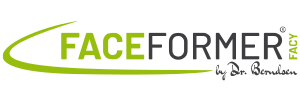Is it dangerous to wear the FaceFormer® at night and not be able to breathe through the mouth?
Question
I suffer from sleep apnoea and have breathing stops at night. I notice that I can’t breathe through my nose and have to gasp for air with my mouth.
If I now wear the Faceformer at night in the 3rd week, I can no longer gasp for air through my mouth when I have interruptions.
Isn’t that dangerous? I don’t quite understand.
Answer
After about 3 weeks of FaceFormer training, your nasal breathing should have noticeably improved. You will then have to learn to breathe through your nose all the time, even at night. This is unusual at first, but must be adjusted. Of course, this only works if your mouth is closed at night and you always have to breathe through your nose. That is why the FaceFormer is used at night. It can easily be pulled out of the mouth. This will probably happen from time to time at the beginning of the nightly use. You may not notice it because you are doing it at a stage when you are still sleeping lightly.
Be sure to use the FaceFormer regularly at night. Don’t be surprised if it is often on your pillow at first. It did not slip out of the mouth vestibule, you pulled it out. If it is still in the front of your mouth in the morning, you have breathed well through your nose during the night. This is exactly what you have to get into the habit of doing.
